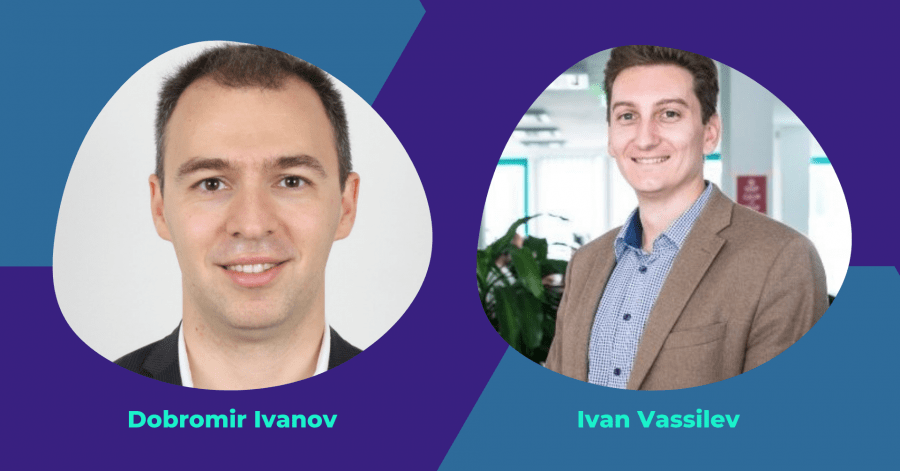Although Bulgaria is in limbo, as political parties quarrel, unable to form a government, innovation has finally started to climb up on the top of the political agenda. Several key developments lead in this direction.
The latest revision of the Bulgarian Recovery and Resilience plan, which will help the Bulgarian economy transition to a post-COVID reality and grow sustainably, has the biggest portion of the budget devoted to innovation and digitalization.
The newly elected parliament formed a designated commission for digitalization and e-governance. Its goal is to initiate much-needed amendments to the legislation to reflect the digital transformation of the economy.
The Ministry of Economy recently made a commitment to work for Bulgaria to receive the EU “Startup Nation Standard of Excellence”. The ministry is also on the final stretch to offer a startup visa for non-EU founders who want to open their business in Bulgaria.
The Bulgarian startup association (BESCO), an NGO, acting as a bridge between the startups and various private and public actors affecting the innovation industry, is at the forefront of all these developments. The organization is working with politicians on a series of reforms that will improve the framework for doing digital business in Bulgaria and position the country as a leading innovation power in the region.
The Recursive met with Dobromir Ivanov, chairman of BESCO, and Ivan Vassilev, vice chairman of the organization to learn more about this process and how the reforms will benefit the innovation industry and the business environment at large.
The Recursive: Do you think there is momentum for innovation policies to become a priority in the Bulgarian political agenda?
Dobromir Ivanov: There’s momentum for BESCO as an organization. In the first two years, we were mostly educating politicians, building credibility, and learning how this game works. Right now we are at our tipping point. All of the main political parties respect what we аre doing and want to work with us.
There are more and more young politicians who have different mindsets and approaches. Some of them are coming from the IT industry. Several years ago there were none of them. The door is open now and there are people that communicate in the same language.
Ivan Vassilev: In July, before the last elections, we organized a debate with all the major political parties in Bulgaria. It was a strange debate because there was no confrontation. Аll parties supported our vision that to grow, the Bulgarian ecosystem should have access to talent, access to capital, and the ease of doing business.
Together with the members of the parliament, we created a commission for digitalization, e-governance, and ITC in the National Assembly. We are working with the Ministry of Economy to finalize the startup visa process to make it attractive for foreign entrepreneurs to come to Bulgaria.
We worked closely with Deputy Prime Minister Atanas Pekanov (in the caretaker Bulgarian government – ed. note) to include “Scale-up Bulgaria” reform in the National Plan for Recovery and Resilience.
Most of its budget will go to innovation and digitalization.
How quickly do you expect to move forward with these topics given the chaos of Bulgarian political life right now?
Dobromir: It’s a strange situation in Bulgaria. We don’t know what’s going to happen in the next month. We don’t know whether we will have a parliament or not. We prefer to have a stable parliament and a regular government because what we are doing is long-term oriented.
Ivan: We need a horizon of at least six months so that we can plan our initiatives and legislation changes and finalize them in the best possible way.
Tell us about the “Scale-up Bulgaria” reform that is included in the National Recovery Plan.
Dobromir: There are seven key areas that can boost startup and innovation in Bulgaria that are part of “Scale-up Bulgaria”.
The first one is the creation of a new legal entity, a legal enterprise to act in Bulgarian commercial law that will be much more flexible, and easier to do options pool vesting, tag-along, drag-along, etc.
Ivan: It will regulate the relationship between the founder and the employees and between the founder, and the investors.
Dobromir: This is very important for startups, scale-ups, and tech companies. It is good for every business in Bulgaria because the current limited company and joint-stock company are good for the 19th century, but not for the 21st century. The project of the bill is ready, we have worked on it for the last three years. But this is a huge change in Commercial law. There will be plenty of discussions in the parliament, and we need time for these discussions to finalize it.
The other element of the reform is the e-identity that will allow private solutions for e-identity to become national e-identity. It’s important for all businesses because we need to communicate digitally with institutions.
The third one is faster liquidation of the companies. It’s good to start easy but you also have to finish your business easier than it is right now.
Ivan: Other key battles in the reform include the option for pension funds to invest in venture capital, angel investment incentives, improving the process for blue cards for workers outside the EU, and startup visa for entrepreneurs outside the EU. But to implement these topics, we need a parliament with more than six months on the horizon.
Dobromir: And finally there’s the regulation of remote work because especially in the COVID-19 situation most of the companies work remotely. And still in Bulgaria remote work is almost illegal.
Ivan: There’s some definition in the law but it’s outdated. We need to build a good environment for remote work because it’s just the reality and it should be created the right way.
Dobromir: These seven areas are all reforms, and they’re not connected with money. The government needs to make these changes in the legislation to receive the money from the plan.
There is one specific €10M project connected with innovation policies in the Plan. It’s about creating a one-stop-shop for launching a business in Bulgaria. It will be an online platform where you will have all the information for any kind of business. Like a roadmap – all the documents you need, all the institutions that you need to communicate with, all the licenses – everything that you need to start a business. You can send all the documents to the institutions through that platform and you can receive the documentation there. It’s a single point of contact for everything that you need to develop a business in Bulgaria. If approved, the money will go directly to the government, and they’re going to make a procedure to decide who’s going to implement it.
We created the concept and we believe it is very important to happen because now when you want to launch a business in Bulgaria, you have really no idea how many months it takes for you to actually start it, you don’t know what criteria you need to match. You’re just guessing and asking some people. It’s hard for Bulgarians and it makes it a very bad environment for foreigners who want to come here and do business.

What about the startup visa? When are we going to have a working solution for it?
Ivan: The startup visa was voted in March in the National Assembly. The Ministry of Economy created an ordinance that is now in public discussion, and it ends on the 4th of September. We are now working with the Ministry of Economy to improve it in order to make it a working startup visa and to make it attractive for foreign entrepreneurs.
After the 4th of September, the Council of Ministers will vote and accept it with a decree. We will have a working startup visa in the fall.
You recently signed a “Startup nation standard” with the Minister of Economy. What is its goal?
Ivan: On a European level BESCO is part of two policy lobbying associations. Together with our European colleagues from the alliance of startups, we started to think about an initiative that can combine most of the policies on a European level, and promote, and boost this process. They lobbied in front of the European Commission to make it a European Commission initiative.
In March The European Commission launched the “Startup nation standard” which includes eight key factors. If it makes all these happen, the country receives the “Startup Nation Standard of Excellence”. Bulgaria joined this initiative in August. It took time to convince our government that this is an important initiative and we should be there. It is good that Bulgaria is working on all of these eight topics. We have some progress and I think that if there is a political will, we can be one of the first countries in Europe to receive the ”Startup Nation Standard of Excellence”.
So, it’s basically like a certificate for a country that it’s good for startups?
Ivan: Yes it’s the best place to start a business in Europe.
Dobromir: Just like the Recovery plan, the Startup Nation standard is a tool that helps us prioritize and convince politicians to act on those incentives. They offer concrete steps for everybody to contribute.
The government is committing that these eight topics are a priority for them to make Bulgaria, more fun, friendly place for startups. We already mentioned them – having a one-stop-shop for founding a business, a startup visa, a law for stock options, promoting more diversity in startup founders, etc. I think we are on a good track and with a little bit of political will, we can achieve this.
Ivan: We’re also participating on a European level in the Scale-up Europe initiative, created by The French Tech and president Emanuel Macron. He is the patron of the initiative. It will be one of his priorities during the French presidency of the European Council next year.
How does the macro frame of “Scaleup Europe” help Bulgaria achieve its goals of being a startup-friendly country?
Ivan: There is no battle between the European countries because we are on a different level of development. Putting these key priorities on the European level helps us to leapfrog, not to go step by step.
President Macron will try to find a coalition of national leaders across Europe to include these policies in their national policies.
In Europe, we don’t have an EU standardized startup visa. Each country has its regulation. If you’re an entrepreneur coming from Asia and want to start a business in Europe, if you go to France there is one set of rules, if you go to Germany, you have another regulation. The Scale-up Europe initiative says that all startup-friendly legislation should be pan-European legislation. This helps us because if these become EU regulations, it’s easier to transpose them on a national basis.
Dobromir: Our dream is that we could be the organization that helps Bulgaria not to copy what the other countries were doing in the last decades. We want Bulgaria to be the first country in the so-called industry of the future. We believe that in the next year for example we can create great legislation for autonomous vehicles or for something new that is coming and all the other countries are wondering how to regulate it. We could be faster. Now we need to use what Europe has as a vision to solve our problems, but then we should be actually the fastest country in building, and creating an environment for industries of the future.

You helped introduce a commission for digitalization and e-governance in the National Assembly. What will be on top of its agenda?
Ivan: The creation of this commission is a sign from the members of the National Assembly that this topic is important. It will start with small steps, which are important but they’re not the most important battles for us.
It will start with e-identity because it’s the key to working e-government.
What do we need to do to have a working e-identity?
Ivan: What we need to do is for the Council of Ministers to sign а decree that says we accept public and private schemes for notification. That’s all. To have a working e-identity, there are three possible ways. One is to have only a public identity, which is one of the projects in the National Recovery Plan. 120 million will go to building e-identity. The second one is to have only private schemes for notifications, companies like Evrotrust. And the third one is to have both. We think it is better for Bulgaria to have both. When there’s competition, the client, in this case, every citizen, is always happier.
Dobromir: In Bulgaria, there are two private companies that do this – Evrotrust and Borica. The European Commission sets criteria and if you meet them, you can propose your solution for e-identity and the government can accept it. This could start literally tomorrow, it could happen even right now. Whereas governmental e-identity is a project that will probably develop in the next five years. Now, we are one of the only four countries in the EU that doesn’t have a national e-identity, and we won’t have it in the next five years. We need a faster solution and the faster solution is the private solution.
What incentives should be adopted on a local level to stimulate municipalities in Bulgaria to create innovations?
Dobromir: For Sofia Municipality there is the sandbox for startups – a faster way for startup companies to work with the Municipality. The municipalities are like clients of the startups and it’s for smart city solutions mainly. There are plenty of incentives that one country can create for its entrepreneurs. Angel investment is something that could actually provide a lot of money that right now is in the banks. This money could be with entrepreneurs and to help them grow or start.
Ivan: There are a lot of municipalities who are trying to attract talent, and to create an ecosystem – Burgas, Blagoevgrad, Stara Zagora, Gabrovo, Varna. The recipe for attracting innovation is first for the mayor to have a vision of how to transform the city. The second one is to be open, to listen to different views, to be ready to innovate and transform. Sometimes they want to attract talent and to have a startup ecosystem, but they don’t want to transform some of the processes within the municipality which are not working. The third one is to give some incentives. We see now in Sofia there’s no place for children in kindergartens. Let’s say the mayor of Burgas comes and says: all entrepreneurs come to Burgas we have free spaces for you in the kindergartens. And we’re open to your ideas and we can implement them within the municipality in the next year. I think this may attract some of the entrepreneurs.








